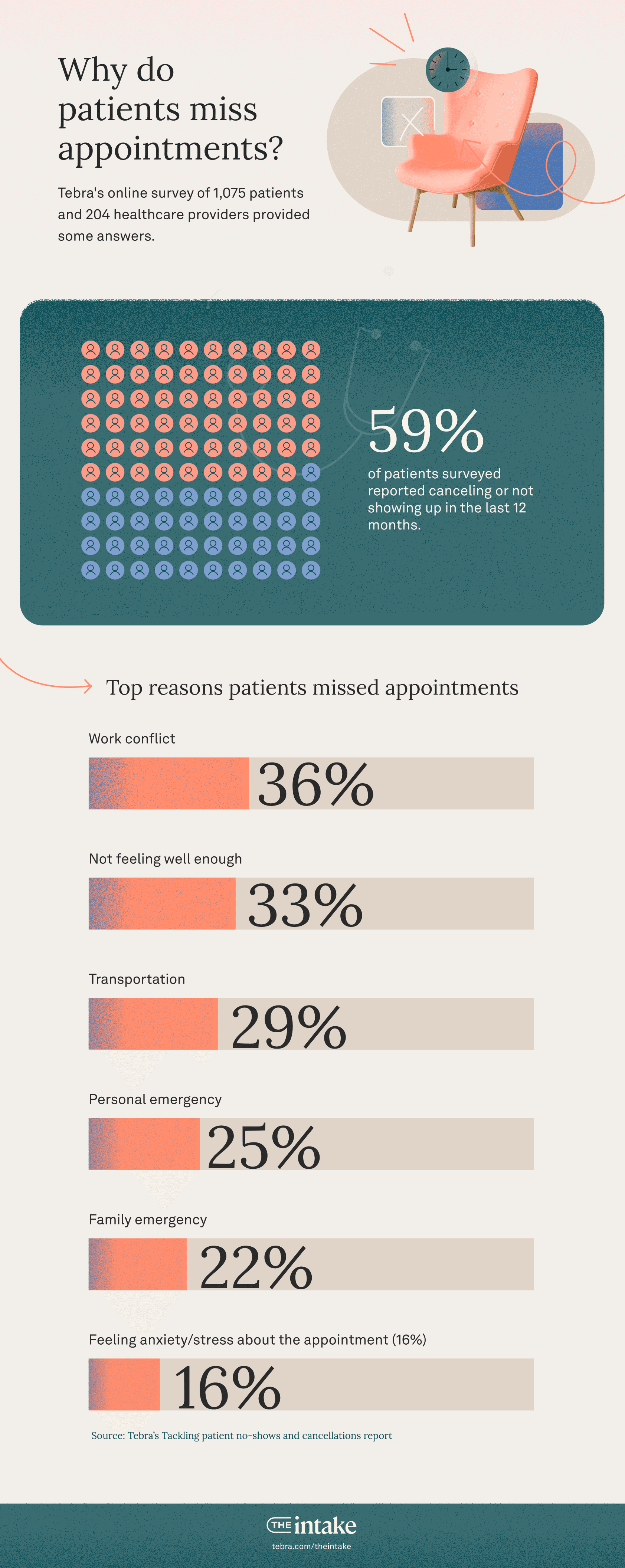How to properly bill patients for missed appointments
Discover how no-show fees can discourage missed appointments — and how you can bill patients who miss appointments the right way.

Overview
- Set clear policies and inform patients about missed appointment fees in advance.
- Ensure compliance with state laws before charging no-show fees.
- Offer grace periods or waivers for first-time missed appointments.
Effective patient scheduling plays a critical role in every successful medical practice. So when patients miss their carefully scheduled appointments, it can throw your entire practice schedule off, leading to frustrated physicians and patients.
But it’s more than just an inconvenience. Appointment no-shows are also expensive. A recent Tebra survey found that appointment no-shows can cost practices as much as $7,500 per month. To make up for the loss and to deter no-shows, many practices opt to bill patients for those missed appointments.
However, this brings up some important questions: How much should you charge for patient missed appointments? When are you actually allowed to charge no-show fees? And who’s responsible for paying them?
Read on as we cover everything you need to know about correctly billing patients for missed appointments, so you can keep your patients happy and your practice schedule full.
Top reasons why patients miss medical appointments
Patients failing to show up to their scheduled appointments isn’t entirely uncommon — recent Tebra research found that 59% of patients canceled or didn’t show up to a medical appointment in the last 12 months.
Patients usually don’t intentionally skip medical appointments. In most cases, something unexpected comes up that prevents them from making it to their scheduled appointments. At the top of the list? Work conflicts, illness, and transportation issues.
According to Tebra’s online survey of 1,075 patients and 204 healthcare providers, the top reasons patients missed appointments include:
- Work conflict (36%)
- Not feeling well enough (33%)
- Transportation (29%)
- Personal emergency (25%)
- Family emergency (22%)
- Feeling anxiety/stress about the appointment (16%)
Of course, there are many valid reasons to miss an appointment. But ultimately, if patients don’t show up, you don’t get paid. It also impacts the experience of other patients who are trying to secure appointments.
To keep patients coming back, it’s important to have a strategy for managing those missed appointments that both prioritizes the success of your practice and the patient experience.

Can you prevent appointment no-shows and late arrivals?
Yes — and no. The vast majority of patients report there’s nothing their provider could do to prevent them from canceling, rescheduling, or not showing up. But there are some tried-and-true — and patient-approved — strategies that can help minimize no-shows, including:
- Sending more automated reminders for appointments. 79% of providers use automated reminders to improve appointment attendance.
- Increasing the availability of same-day or next-day appointments. 71% of patients report that more immediate appointments would keep them from missing their appointments.
- Requiring co-pay in advance. 16% of patients believe requiring a co-pay would minimize the likelihood of missing an appointment.
Tip: Successfully scale your practice with these tactics for patient scheduling and retention that keep your calendar full.
Modern medical appointment reminders have revolutionized how practices maintain full schedules while improving patient satisfaction.
What is the best way to deal with patients who are routinely late for their appointments?
We’ve all arrived late to an appointment at some point or another. Sometimes the unavoidable happens and we get stuck in traffic, or we get pulled into an unexpected work meeting. Navigating late arrivals with empathy can go a long way in building better relationships with your patients.
“Navigating late arrivals with empathy can go a long way in building better relationships with your patients.”
However, patients who are consistently late or have a history of missing their appointments can become frustrating to manage. Simply charging patients for missed appointments can be tempting. But while the best way to deal with patients who make a habit of being late can depend on your practice and your patients, start with these strategies:
- Address concerns directly with the patient: Life gets busy and appointments can slip through the cracks. Sometimes a gentle reminder about the implications of their tardiness on the practice — and their fellow patients — can help patients better stay on top of their appointments.
- Understand why they’re late: Asking questions to understand why your patients tend to be late can help you help them be on time in the future. For example, if a patient is consistently late due to a transportation schedule, adjusting their appointment time might make it easier for them to be on time.
- Create a late arrival policy: A written policy around late arrivals can help deter late patients. For example, you might create a policy that says patients who are 10 minutes late for their appointment will be considered a no-show — meaning they’ll forfeit their appointment and be subject to a missed appointment fee. It’s worth also considering true emergencies in your policy, such as accidents or illnesses, so you aren’t penalizing patients for things out of their control.
How do you deal with no-show patients?
You can do your best to reduce the likelihood of patient cancellations and no-shows. However, the occasional no-show is still (unfortunately) inevitable.
Here are some ways to handle missed appointments when they do come up.
Issue a warning or notice
We know that when a patient fails to show up for an appointment it can happen for a variety of different reasons. Issuing a reminder is a good way to address the missed appointment without pointing fingers.
A warning or notice for a missed appointment should include:
- A reminder of the missed appointment
- An invitation to reschedule at another time
- A note about how no-shows impact the practice and other patients
- A reminder of your no-show policy
Whether this is communicated via email or over the phone, the goal is to deter future missed appointments without negatively impacting the patient-practice relationship. In most cases, your patient likely already feels bad for missing their appointment, so the last thing you want is to discourage them from returning.
Charge the patient a no-show fee
A no-show fee or missed appointment fee is the amount a practice bills a patient when they fail to show up for an appointment. These fees are relatively common among medical practices and are designed to serve 2 purposes: to cover the loss of a missed appointment opportunity for the practice and to deter patients from missing appointments.
If you intend to charge a patient a no-show fee for a missed appointment, it’s important to clearly communicate your fees and policies to all your patients ahead of time.
“If you intend to charge a patient a no-show fee for a missed appointment, it’s important to clearly communicate your fees and policies to all your patients ahead of time.”
Later in this article, we’ll dive deeper into when you’re allowed to bill for missed appointments and how to do it properly.
End the patient-practice relationship
Patients who consistently miss appointments can be disruptive to your practice. In some instances, it can be appropriate to terminate the relationship. A study of patient dismissals found that 74% of patient dismissals were due to patients repeatedly missing appointments.
Generally, terminating a relationship with a patient should be considered a last resort, as doing so can impact the patient’s healthcare experience and their access to care.
According to the American Medical Association (AMA), physicians have a fiduciary responsibility to ensure continuity of care, meaning if you choose to dismiss a patient over missed appointments, you must provide reasonable notice and support your patient with transfer to another care provider where necessary.
You’re also required to follow any other jurisdiction-specific rules around dismissing a patient. For example, in California, under the California Business and Professions Code, if you fail to provide written notice around termination and do not provide reasonable notice, you can be charged with patient abandonment.
Can you bill for missed appointments?
For the most part, yes, medical practices can bill patients for missed appointments. The AMA code of ethics clarifies that charging patients a reasonable fee for cancellations that happen within 24 hours of a scheduled appointment is justifiable and ethical. However, it specifically requires that the patient must be made aware of the charge in advance.
Bear in mind that most payers won’t cover cancellation or missed appointment fees, which means your patients will have to pay the charges out of their own pockets.
Charging patients for missed appointments and implementing a no-show policy
Thinking about implementing a fee for missed appointments? Here are some things to consider when charging for patient missed appointments.
Decide when to charge a no-show fee
Not all practices automatically charge a no-show fee for every missed appointment. Most no-show policies have some flexibility to accommodate those once-in-a-blue-moon situations at the practice’s discretion.
Some questions to ask when deciding when you want to charge patients for missed appointments include:
- Will you implement a strike policy? How many times can a patient miss an appointment before you bill them? Or will you opt for a zero-tolerance policy for missed appointments? This means that any time a patient is a no-show, you’ll immediately bill them.
- How will you navigate late patients or cancellations? Are patients who are late subject to the same no-show policy? At what point does a late patient become a no-show?
- Will you have a flat rate or will fees increase over time? Some practices opt to charge the same flat fee for every missed appointment. Others charge progressively higher fees if patients continue to miss appointments.
- How will you manage physician cancellations? Last-minute cancellations can happen on both sides of the table. To be fair to your patients, you should also consider how you’ll manage cancellations in the event the physician needs to cancel or reschedule appointments within 24 hours.
- What is your policy for sickness and communicable diseases? The last thing you want is for your patients to come in while sick with the flu or COVID-19 to avoid the cancellation fee. Sick patients can impact the experience of other patients and can also impact your practice team. There should be a policy around making sure patients who are truly ill are able to reschedule.
Keep in mind that you can’t discriminate between different types of patients when it comes to charging for missed appointments, regardless if they pay out of pocket, through Medicare, or through any other payer. So when you charge a no-show fee, you should apply it consistently across all your patients.
Determine your missed appointment fees
When you decide how much to charge for missed appointments, your first instinct might be to charge 100% of the cost of the appointment. However, it’s uncommon for practices to do so.
While billing for missed appointments can improve your no-show rates, high fees can be a barrier for many patients. Ultimately your goal should be to deter, not penalize. If your administrative fees are financially prohibitive, you may find yourself struggling to retain your patients and grow your practice.
“The fee should be enough to deter patients from skipping appointments, but not so high that it drives them away from your practice.”
At the end of the day, how much to charge for missed appointments is up to you, but it’s important to strike a delicate balance: the fee should be enough to deter patients from skipping appointments, but not so high that it drives them away from your practice.
Unfortunately, in most situations, your practice will absorb at least some of the costs of a missed appointment. No-show fees can help cover some of the opportunity costs, but the primary goal should be to encourage patients to show up to their appointments — not to cover your losses if they don’t.
Notify patients of your cancellation and no-show policy
Missed appointment fees shouldn’t be a surprise to your patients. Your policy should always be easily available to your patients in writing, whether online or in person. Consider having them sign the policy alongside their intake papers, such as their HIPAA notice of privacy practices.
For example, some practices might email patients a copy of the missed appointment policy at the time of booking and along with appointment reminders. Others may post a copy in their waiting room to keep it front and center any time patients visit.
Here’s a simple checklist to make sure that your missed appointment policy is clear and covers all your bases:
Missed appointment policy checklist
- Describe what’s considered a late cancellation or no-show. For example: “Cancellations must be made 24 hours ahead of a scheduled appointment. Cancellations made within 24 hours of a scheduled appointment will be considered late cancellations. Patients who arrive 10 minutes or later to a scheduled appointment will be considered to have missed their appointment.”
- Explain why the policy exists. For example: “When patients miss their scheduled appointments, our physicians are unable to see other patients. We know things change — by canceling your appointment ahead of time, we can make that slot available to other patients.”
- Outline any fees or consequences. For example: “Patients are granted one late cancellation or no-show without penalties. Further late cancellations or missed appointments are subject to a $25 no-show fee.”
Remember: If you make changes to your policy at any time, you’ll need to notify your patients of the changes.
Is there a CPT code for no-show appointments?
No, there isn’t a current procedural terminology (CPT) code for last-minute cancellations or no-show appointments. When a patient misses their appointment, you’re not providing a covered service. Since the patient did not receive a reimbursable service, most insurers or other payers won’t cover the cost of a missed appointment.
Can you bill Medicare patients for missed appointments?
Yes, Medicare allows practices to charge Medicare patients for missed appointments as long as the same policies and fees apply to non-Medicare patients. However, Medicare will not cover these fees or charges, so you’ll have to bill the fee directly to the patient.
Medicare does not provide any guidelines around how much you’re allowed to charge for missed appointments, so it’s up to your practice to determine a reasonable no-show fee.
Medicaid, on the other hand, typically doesn’t allow physicians to charge patients for missed appointments. However, this varies by state.
Reduce missed appointments with a streamlined patient experience
Missed appointments are an inevitable part of operating a medical practice. However, when it becomes a consistent issue, it can significantly impact your practice performance and patient retention.
Fortunately, charging patients for missed appointments is only one way you can reduce and mitigate the impact of no-shows. Learn how elevating your patient experience can help you fill your calendar and scale your practice.
You might also be interested in
Learn how to create a seamless patient experience that increases loyalty and reduces churn, while providing personalized care that drives practice growth in Tebra’s free guide to optimizing your practice.
- Current Version – Nov 04, 2025Written by: Jean LeeChanges: This article was updated to include the most relevant and up-to-date information available.






